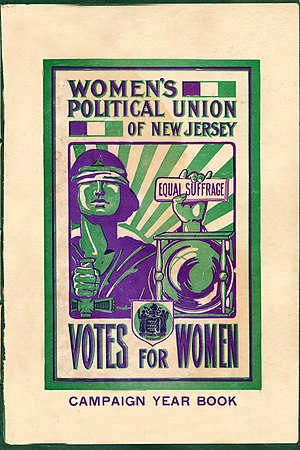
Suffrage was available to most women and African Americans in New Jersey immediately upon the formation of the state. The first New Jersey state constitution (of 1776) allowed any person who owned a certain value of property to become a voter. In 1790, the state constitution was changed to specify that voters were "he or she". Politicians seeking office deliberately courted women voters who often decided narrow elections. This was so the Democratic-Republican Party had an advantage in the presidential election of 1808.[citation needed]
Under the auspices of election reform, in 1807 a "progressive" law was passed which abolished the property requirement for voting, boosting the number of eligible voters, while explicitly barring women and black voters. The law allowed the Democratic-Republican party to win the state in the 1808 United States presidential election under the new direct electoral system.[1] Like many women in other states, New Jersey women became involved in the abolition movement and several prominent abolitionists who later became suffragists lived in the state. One of the early suffrage protests took place when Lucy Stone refused to pay her property taxes in 1857 under the Revolutionary slogan of "taxation without representation".
After the Civil War, some suffrage groups formed and women began to engage in protest voting. African American women formed separate groups to help push for suffrage in their communities. In the late 1880s, a rural school suffrage bill that affected communities with open meetings, was passed, allowing some women limited access to vote. A series of state court cases were filed on different accounts in regards to voting, further muddying the law. In the early 20th century, suffragists in New Jersey grew in numbers and became bolder. They staged meetings, held parades, and other types of publicity stunts to raise awareness for women's suffrage. Most of the different suffrage groups worked together in cooperatives and pushed for a women's suffrage amendment.
In 1915, they had the change to campaign for a voter referendum on the amendment to the New Jersey state constitution. Despite the hard push, the amendment did not pass. Suffragists continued the fight in the state, with the notable addition of the Congressional Union for Woman Suffrage (CU), started by New Jersey's Alice Paul. The CU was later known as the National Woman's Party (NWP) and many New Jersey members acted as Silent Sentinels, protesting in Washington, D.C. They were pushing for a federal suffrage amendment which New Jersey ratified on February 10, 1920.
© MMXXIII Rich X Search. We shall prevail. All rights reserved. Rich X Search
